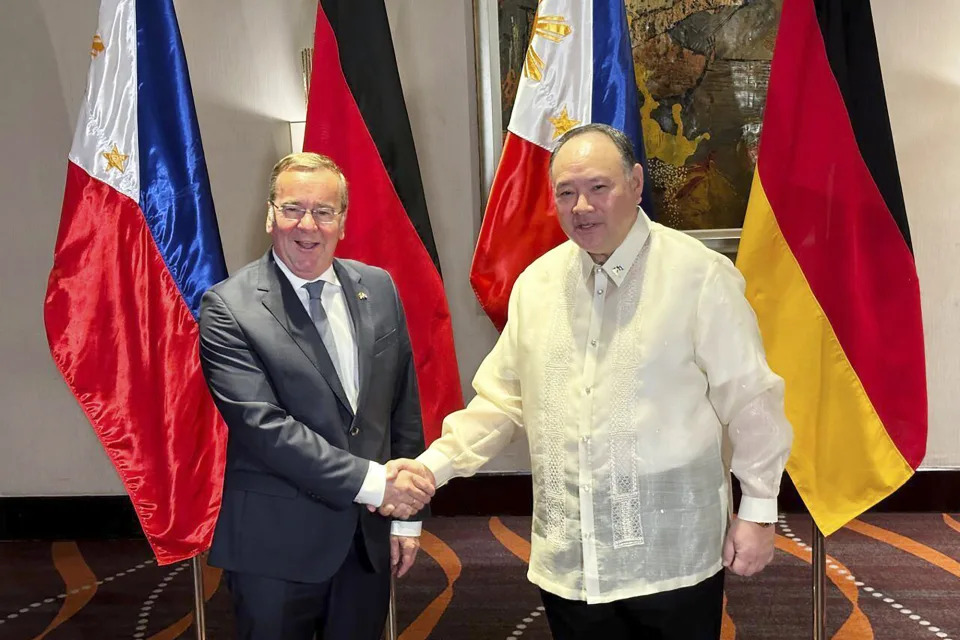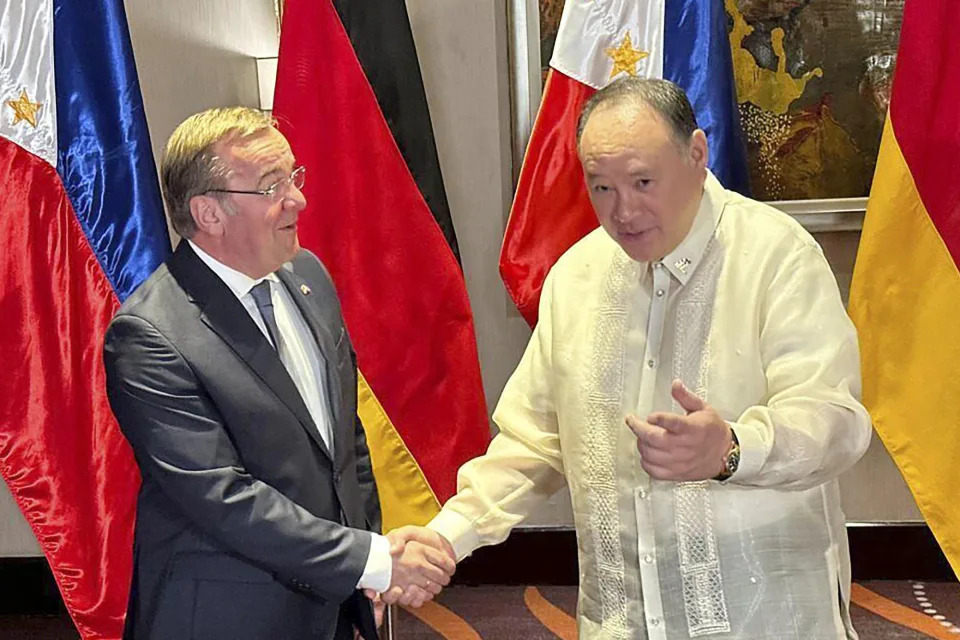NATO IN THE SOUTH CHINA SEA
Germany and the Philippines agree to rapidly finalize a defense pact to address security threats
JIM GOMEZ
Sun, August 4, 2024



German Defense Minister Boris Pistorius, left, meets with his Philippine counterpart Gilberto Teodoro, Jr. in Manila, Philippines, Sunday, Aug. 4, 2024.
(AP Photo/Joeal Calupitan)
MANILA, Philippines (AP) — Germany and the Philippines agreed Sunday to rapidly finalize a defense pact that would allow joint military training and possible sale of German weapons to address security threats, including China’s growing aggression in the South China Sea, which Manila’s defense chief said was “the sole cause of tensions” and conflicts in the disputed waters.
China has long claimed much of the entire seaway, a key global trade and security route, and vowed to defend its territorial interests at all costs.
Philippine Defense Secretary Gilberto Teodoro said the proposed Arrangement on Defense Cooperation that he and German Defense Minister Boris Pistorius discussed in talks in the capital, Manila, could be concluded as early as this year given current security concerns. Both underscored the need for countries to press diplomatic efforts under the U.N. Charter to attain “just and lasting peace” from Ukraine to Asia’s flashpoints.
Without mentioning China by name, both defense chiefs expressed in a joint statement their strong opposition to “any unilateral attempt to advance expansive claims, especially through force or coercion.” They also “reaffirmed their staunch commitment to freedom of navigation, overflight and other peaceful uses of the seas consistent with the U.N. Convention on the Law of the Sea."
The Philippines and its longtime treaty ally, the United States, and other Western countries have frequently accused China of undermining those international principles with Beijing’s increasingly hostile actions, including the use of powerful water cannons, military-grade laser and blocking and other dangerous maneuvers against Philippine ships in the disputed South China Sea. Meanwhile, Philippine President Ferdinand Marcos' administration has moved to expand security alliances with friendly Asian and Western governments.
Beijing has accused Washington of instigating trouble and threatening the stability of the region by boosting the deployment of U.S. forces, warships and jets and working with countries like the Philippines to try to contain China’s rise.
The proposed defense deal would allow joint training, possible weapons sale, security information sharing and closer collaboration between the German and Philippine armed forces, the defense chiefs said.
Responding to a question in a news conference with Pistorius, Teodoro said: “There is only one cause of conflict in the South China Sea. ... It is China’s illegal and unilateral attempt to appropriate most, if not all, of the South China Sea as their internal waters."
"That is the sole cause of tensions,” he added.
"The Philippines is not provoking China. We do not seek war, yet we are mandated not only by our constitution but as an obligation to our countrymen to protect whatever areas whether be jurisdiction or rights that rightfully belong to the exclusive benefit of Filipinos,” Teodoro said.
Pistorius underscored Germany’s support for a 2016 arbitration ruling that invalidated China’s expansive claims in the South China Sea on historic grounds. The decision was based on the U.N. Convention of the Law of the Sea, or UNCLOS.
"This ruling remains valid without any exemptions,” Pistorius said. “We need to do more than stand up for UNCLOS. We need to contribute to de-escalation. This is only possible if we keep all channels of communication open including those with China.”
After an alarmingly violent June 17 confrontation in the Philippine-occupied Second Thomas Shoal in the South China Sea between Chinese forces, who were armed with knives, axe, and improvised spears, and Filipino navy personnel, China and the Philippines reached a temporary agreement last month to prevent further clashes that could spark a major armed conflict in the hotly disputed atoll.
A week after the deal was forged, Philippine government personnel transported food and other supplies to Manila’s territorial ship outpost at the shoal, which has been closely guarded by the Chinese coast guard and navy ships, and no confrontations were reported.
The longstanding territorial conflicts between the neighboring Asian countries, which also involve Vietnam, Malaysia, Brunei and Taiwan, have continued, however, along with a scathing war of words.
___
Associated Press video journalist Joeal Calupitan contributed to this report.

Germany, Philippines agree defense pact over South China Sea
MANILA, Philippines (AP) — Germany and the Philippines agreed Sunday to rapidly finalize a defense pact that would allow joint military training and possible sale of German weapons to address security threats, including China’s growing aggression in the South China Sea, which Manila’s defense chief said was “the sole cause of tensions” and conflicts in the disputed waters.
China has long claimed much of the entire seaway, a key global trade and security route, and vowed to defend its territorial interests at all costs.
Philippine Defense Secretary Gilberto Teodoro said the proposed Arrangement on Defense Cooperation that he and German Defense Minister Boris Pistorius discussed in talks in the capital, Manila, could be concluded as early as this year given current security concerns. Both underscored the need for countries to press diplomatic efforts under the U.N. Charter to attain “just and lasting peace” from Ukraine to Asia’s flashpoints.
Without mentioning China by name, both defense chiefs expressed in a joint statement their strong opposition to “any unilateral attempt to advance expansive claims, especially through force or coercion.” They also “reaffirmed their staunch commitment to freedom of navigation, overflight and other peaceful uses of the seas consistent with the U.N. Convention on the Law of the Sea."
The Philippines and its longtime treaty ally, the United States, and other Western countries have frequently accused China of undermining those international principles with Beijing’s increasingly hostile actions, including the use of powerful water cannons, military-grade laser and blocking and other dangerous maneuvers against Philippine ships in the disputed South China Sea. Meanwhile, Philippine President Ferdinand Marcos' administration has moved to expand security alliances with friendly Asian and Western governments.
Beijing has accused Washington of instigating trouble and threatening the stability of the region by boosting the deployment of U.S. forces, warships and jets and working with countries like the Philippines to try to contain China’s rise.
The proposed defense deal would allow joint training, possible weapons sale, security information sharing and closer collaboration between the German and Philippine armed forces, the defense chiefs said.
Responding to a question in a news conference with Pistorius, Teodoro said: “There is only one cause of conflict in the South China Sea. ... It is China’s illegal and unilateral attempt to appropriate most, if not all, of the South China Sea as their internal waters."
"That is the sole cause of tensions,” he added.
"The Philippines is not provoking China. We do not seek war, yet we are mandated not only by our constitution but as an obligation to our countrymen to protect whatever areas whether be jurisdiction or rights that rightfully belong to the exclusive benefit of Filipinos,” Teodoro said.
Pistorius underscored Germany’s support for a 2016 arbitration ruling that invalidated China’s expansive claims in the South China Sea on historic grounds. The decision was based on the U.N. Convention of the Law of the Sea, or UNCLOS.
"This ruling remains valid without any exemptions,” Pistorius said. “We need to do more than stand up for UNCLOS. We need to contribute to de-escalation. This is only possible if we keep all channels of communication open including those with China.”
After an alarmingly violent June 17 confrontation in the Philippine-occupied Second Thomas Shoal in the South China Sea between Chinese forces, who were armed with knives, axe, and improvised spears, and Filipino navy personnel, China and the Philippines reached a temporary agreement last month to prevent further clashes that could spark a major armed conflict in the hotly disputed atoll.
A week after the deal was forged, Philippine government personnel transported food and other supplies to Manila’s territorial ship outpost at the shoal, which has been closely guarded by the Chinese coast guard and navy ships, and no confrontations were reported.
The longstanding territorial conflicts between the neighboring Asian countries, which also involve Vietnam, Malaysia, Brunei and Taiwan, have continued, however, along with a scathing war of words.
___
Associated Press video journalist Joeal Calupitan contributed to this report.
Germany, Philippines agree defense pact over South China Sea
Diego Mendoza
Sun, August 4, 2024

The News
The Philippines and Germany agreed a new defense deal Sunday as Manila seeks to bolster its diplomatic support to counter Beijing’s vast maritime claims in the South China Sea.
The agreement focuses on “mutual understanding regarding capabilities, training [and] exchange of information,” said the Philippines’ defense minister, suggesting Germany could supply military equipment to the Philippines in the future. Berlin is “strongly opposed [against] any unilateral attempt to advance expansive claims” in the region, Germany’s defense minister said.
China and the Philippines have sparred for months over South China Sea territory, and the two countries recently signed a “tentative agreement” to end hostilities. But Beijing has continued to express frustration toward Manila, prompting the Philippine government to look to Europe and the US for support.
Know More
The German-Philippine defense pact comes as China gets ready to appoint a new ambassador to Germany. Whomever Beijing chooses will have to immediately deal with Berlin’s accusations that Beijing coordinated a cyber espionage attack against a federal cartography agency in 2021.
Germany, Philippines working on defence cooperation deal
DPA
Sun, August 4, 2024

German Defence Minister Boris Pistorius (L) is greeted by his Philippine counterpart Gilberto Teodoro before a bilateral meeting. Soeren Stache/dpa
Germany and the Philippines on Sunday said they are working on a defence cooperation agreement, to be signed later this year, that would expand training between their armed forces and armaments cooperation.
The Philippines has been pushing to boost its external defences amid escalating tensions with China in the disputed South China Sea, and has been signing defence cooperation deals with other countries.
German Defence Minister Boris Pistorius, who was visiting Manila, pledged to conclude the military policy agreement by the end of the year, and maybe as soon as October.
Cooperation could occur in air defence, coastal defence "and possibly the procurement of transport aircraft," Pistorius said after meeting Philippine Defence Secretary Gilberto Teodoro.
Both said that human rights were also a topic of discussion.
Germany wants to increase its involvement in Asia. To this end, the Cabinet adopted guidelines on Germany's policy in the Indo-Pacific region in 2020. Military cooperation is a key element.
To kick off his trip, Pistorius visited the German navy, which is participating in the world's largest naval manoeuvre, Rimpac, with two ships off Hawaii. Air force soldiers took part in an exercise in Japan for the first time. In the middle of the month, German soldiers and combat aircraft will be in India for training, in another first.
In contrast, defence cooperation with the new partners in the Indo-Pacific region is progressing more slowly. A new arms export control law is in the pipeline, but is still a long way off.
Enhancing bilateral relations
In a joint statement, Pistorius and Teodoro said they "strongly opposed any unilateral attempt to advance expansive claims, especially through force or coercion," amid security challenges in both Asia and the Pacific, and Europe.
"Recognizing the wide array of opportunities for enhancing bilateral defense relations in light of security challenges that both countries face, the ministers committed to conclude a broader arrangement on defence cooperation," the ministers said.
"To this end, the ministers are committed to establish long-term relations between the armed forces and specifically to expand training cooperation and bilateral exchanges," the statement added.
"The ministers, moreover, intend to explore opportunities to further expand the bilateral armaments cooperation and to engage in joint projects."
While stressing that the enhanced cooperation was not directed at a specific country amid the Philippines' dispute with China over the South China Sea, Pistorius told a press conference: "All countries must be able to enjoy freedom of navigation, regardless of the economic strength or geographic size. This is what we stand up for together with our partners."
Teodoro said the enhanced cooperation would help the Philippines protect its sovereignty and the rights of its people, such as fishermen who are being deprived of their livelihood amid China's aggressive action in the South China Sea - including in areas that are part of the Philippines' exclusive economic zone.
"There is only one cause of conflict in the South China Sea, particularly in the West Philippine Sea - it is China's illegal and unilateral attempt to appropriate most if not all of the South China Sea as their internal waters," Teodoro said.
"The Philippines is not provoking China. We do not seek war," he added.
China, which claims almost the entire South China Sea, has taken increasingly aggressive actions in the area in recent years. It has ignored a 2016 ruling by an international arbitration court that it has no legal or historical basis for its expansive claims.
Vietnam, Malaysia, Brunei and Taiwan also have claims to the area, which is believed to be rich in natural resources.

German Defence Minister Boris Pistorius (L) speaks during a joint press conference with his Philippine counterpart Gilberto Teodoro (Not Pictured). Soeren Stache/dpa

German Defence Minister Boris Pistorius (2nd L) meets with his Philippine counterpart Gilberto Teodoro (2nd R). Soeren Stache/dpa
No comments:
Post a Comment